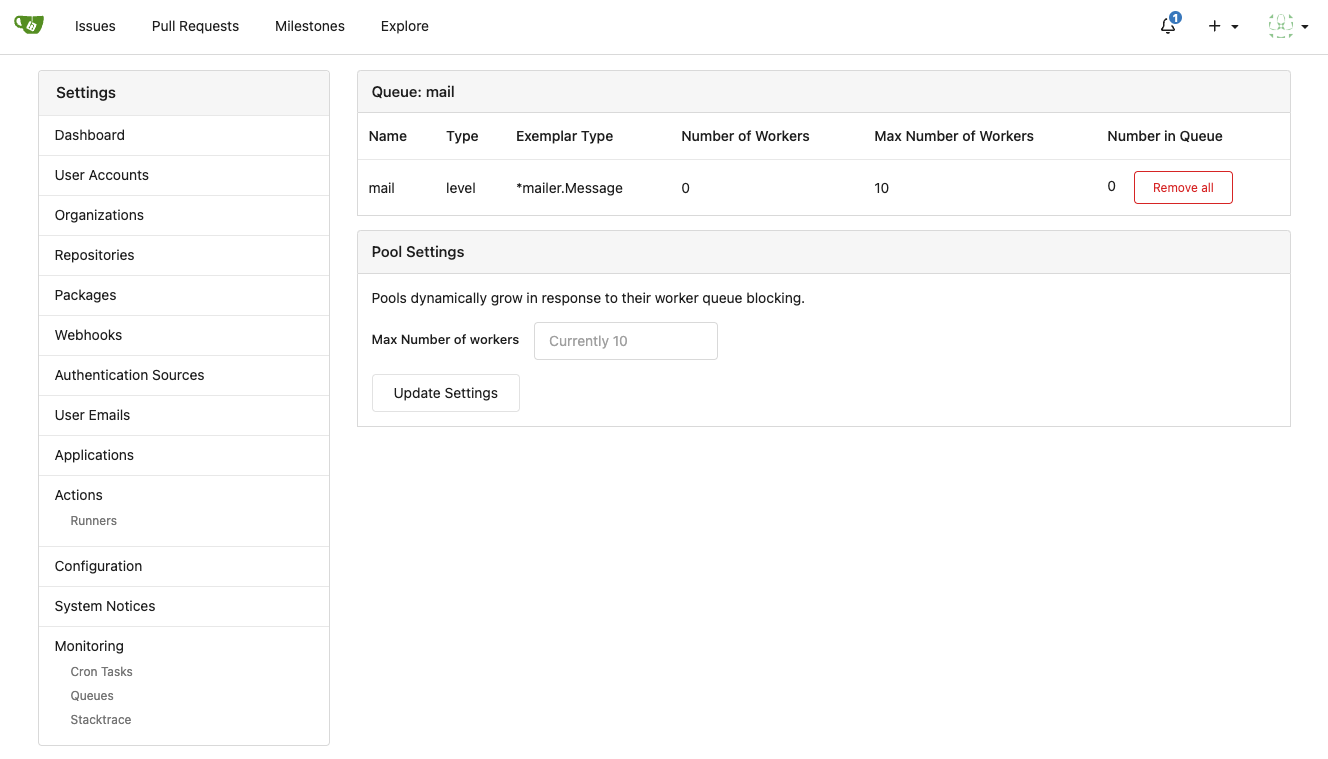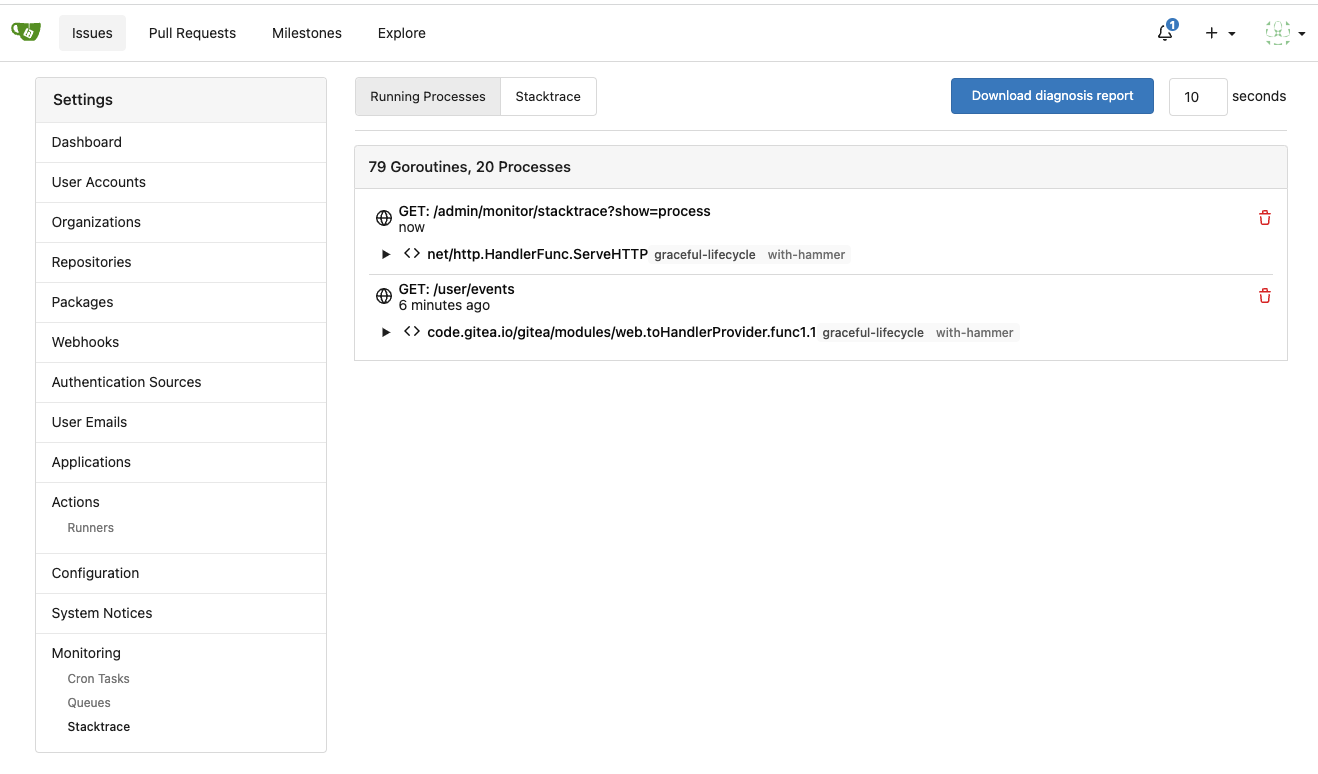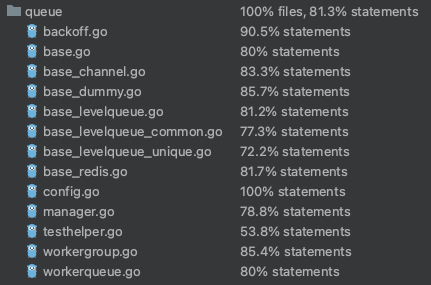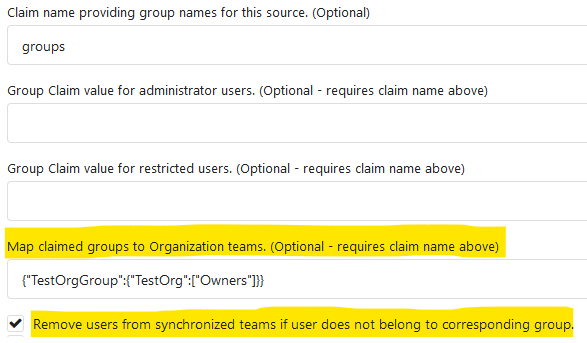## ⚠️ Breaking
The `log.<mode>.<logger>` style config has been dropped. If you used it,
please check the new config manual & app.example.ini to make your
instance output logs as expected.
Although many legacy options still work, it's encouraged to upgrade to
the new options.
The SMTP logger is deleted because SMTP is not suitable to collect logs.
If you have manually configured Gitea log options, please confirm the
logger system works as expected after upgrading.
## Description
Close#12082 and maybe more log-related issues, resolve some related
FIXMEs in old code (which seems unfixable before)
Just like rewriting queue #24505 : make code maintainable, clear legacy
bugs, and add the ability to support more writers (eg: JSON, structured
log)
There is a new document (with examples): `logging-config.en-us.md`
This PR is safer than the queue rewriting, because it's just for
logging, it won't break other logic.
## The old problems
The logging system is quite old and difficult to maintain:
* Unclear concepts: Logger, NamedLogger, MultiChannelledLogger,
SubLogger, EventLogger, WriterLogger etc
* Some code is diffuclt to konw whether it is right:
`log.DelNamedLogger("console")` vs `log.DelNamedLogger(log.DEFAULT)` vs
`log.DelLogger("console")`
* The old system heavily depends on ini config system, it's difficult to
create new logger for different purpose, and it's very fragile.
* The "color" trick is difficult to use and read, many colors are
unnecessary, and in the future structured log could help
* It's difficult to add other log formats, eg: JSON format
* The log outputer doesn't have full control of its goroutine, it's
difficult to make outputer have advanced behaviors
* The logs could be lost in some cases: eg: no Fatal error when using
CLI.
* Config options are passed by JSON, which is quite fragile.
* INI package makes the KEY in `[log]` section visible in `[log.sub1]`
and `[log.sub1.subA]`, this behavior is quite fragile and would cause
more unclear problems, and there is no strong requirement to support
`log.<mode>.<logger>` syntax.
## The new design
See `logger.go` for documents.
## Screenshot
<details>



</details>
## TODO
* [x] add some new tests
* [x] fix some tests
* [x] test some sub-commands (manually ....)
---------
Co-authored-by: Jason Song <i@wolfogre.com>
Co-authored-by: delvh <dev.lh@web.de>
Co-authored-by: Giteabot <teabot@gitea.io>
Although some features are mixed together in this PR, this PR is not
that large, and these features are all related.
Actually there are more than 70 lines are for a toy "test queue", so
this PR is quite simple.
Major features:
1. Allow site admin to clear a queue (remove all items in a queue)
* Because there is no transaction, the "unique queue" could be corrupted
in rare cases, that's unfixable.
* eg: the item is in the "set" but not in the "list", so the item would
never be able to be pushed into the queue.
* Now site admin could simply clear the queue, then everything becomes
correct, the lost items could be re-pushed into queue by future
operations.
3. Split the "admin/monitor" to separate pages
4. Allow to download diagnosis report
* In history, there were many users reporting that Gitea queue gets
stuck, or Gitea's CPU is 100%
* With diagnosis report, maintainers could know what happens clearly
The diagnosis report sample:
[gitea-diagnosis-20230510-192913.zip](https://github.com/go-gitea/gitea/files/11441346/gitea-diagnosis-20230510-192913.zip)
, use "go tool pprof profile.dat" to view the report.
Screenshots:



---------
Co-authored-by: Jason Song <i@wolfogre.com>
Co-authored-by: Giteabot <teabot@gitea.io>
# ⚠️ Breaking
Many deprecated queue config options are removed (actually, they should
have been removed in 1.18/1.19).
If you see the fatal message when starting Gitea: "Please update your
app.ini to remove deprecated config options", please follow the error
messages to remove these options from your app.ini.
Example:
```
2023/05/06 19:39:22 [E] Removed queue option: `[indexer].ISSUE_INDEXER_QUEUE_TYPE`. Use new options in `[queue.issue_indexer]`
2023/05/06 19:39:22 [E] Removed queue option: `[indexer].UPDATE_BUFFER_LEN`. Use new options in `[queue.issue_indexer]`
2023/05/06 19:39:22 [F] Please update your app.ini to remove deprecated config options
```
Many options in `[queue]` are are dropped, including:
`WRAP_IF_NECESSARY`, `MAX_ATTEMPTS`, `TIMEOUT`, `WORKERS`,
`BLOCK_TIMEOUT`, `BOOST_TIMEOUT`, `BOOST_WORKERS`, they can be removed
from app.ini.
# The problem
The old queue package has some legacy problems:
* complexity: I doubt few people could tell how it works.
* maintainability: Too many channels and mutex/cond are mixed together,
too many different structs/interfaces depends each other.
* stability: due to the complexity & maintainability, sometimes there
are strange bugs and difficult to debug, and some code doesn't have test
(indeed some code is difficult to test because a lot of things are mixed
together).
* general applicability: although it is called "queue", its behavior is
not a well-known queue.
* scalability: it doesn't seem easy to make it work with a cluster
without breaking its behaviors.
It came from some very old code to "avoid breaking", however, its
technical debt is too heavy now. It's a good time to introduce a better
"queue" package.
# The new queue package
It keeps using old config and concept as much as possible.
* It only contains two major kinds of concepts:
* The "base queue": channel, levelqueue, redis
* They have the same abstraction, the same interface, and they are
tested by the same testing code.
* The "WokerPoolQueue", it uses the "base queue" to provide "worker
pool" function, calls the "handler" to process the data in the base
queue.
* The new code doesn't do "PushBack"
* Think about a queue with many workers, the "PushBack" can't guarantee
the order for re-queued unhandled items, so in new code it just does
"normal push"
* The new code doesn't do "pause/resume"
* The "pause/resume" was designed to handle some handler's failure: eg:
document indexer (elasticsearch) is down
* If a queue is paused for long time, either the producers blocks or the
new items are dropped.
* The new code doesn't do such "pause/resume" trick, it's not a common
queue's behavior and it doesn't help much.
* If there are unhandled items, the "push" function just blocks for a
few seconds and then re-queue them and retry.
* The new code doesn't do "worker booster"
* Gitea's queue's handlers are light functions, the cost is only the
go-routine, so it doesn't make sense to "boost" them.
* The new code only use "max worker number" to limit the concurrent
workers.
* The new "Push" never blocks forever
* Instead of creating more and more blocking goroutines, return an error
is more friendly to the server and to the end user.
There are more details in code comments: eg: the "Flush" problem, the
strange "code.index" hanging problem, the "immediate" queue problem.
Almost ready for review.
TODO:
* [x] add some necessary comments during review
* [x] add some more tests if necessary
* [x] update documents and config options
* [x] test max worker / active worker
* [x] re-run the CI tasks to see whether any test is flaky
* [x] improve the `handleOldLengthConfiguration` to provide more
friendly messages
* [x] fine tune default config values (eg: length?)
## Code coverage:

The "modules/context.go" is too large to maintain.
This PR splits it to separate files, eg: context_request.go,
context_response.go, context_serve.go
This PR will help:
1. The future refactoring for Gitea's web context (eg: simplify the context)
2. Introduce proper "range request" support
3. Introduce context function
This PR only moves code, doesn't change any logic.
This gives more "freshness" to the explore page. So it's not just the
same X users on the explore page by default, now it matches the same
sort as the repos on the explore page.
---------
Co-authored-by: Lunny Xiao <xiaolunwen@gmail.com>
There was only one `IsRepositoryExist` function, it did: `has && isDir`
However it's not right, and it would cause 500 error when creating a new
repository if the dir exists.
Then, it was changed to `has || isDir`, it is still incorrect, it
affects the "adopt repo" logic.
To make the logic clear:
* IsRepositoryModelOrDirExist
* IsRepositoryModelExist
The first step of #23328
This PR cleans:
1. Dead function like `SubStr`
2. Unnecessary function like `UseHTTPS`, it should be provided by
`window.origin`
3. Duplicate function like `IsShowFullName`, there was already a
`DeafultShowFullName`
I have searched these removed functions globally, no use in code.
Changes:
- `RenderWithErr` should render `tplUserEdit` not `tplUserNew` in edit
page
- If error occurred in `HandleUsernameChange` redirect to original edit
page instead of user list page
When there is an error creating a new openIDConnect authentication
source try to handle the error a little better.
Close#23283
Signed-off-by: Andrew Thornton <art27@cantab.net>
Co-authored-by: techknowlogick <techknowlogick@gitea.io>
Partially fix#23050
After #22294 merged, it always has a warning log like `cannot get
context cache` when starting up. This should not affect any real life
but it's annoying. This PR will fix the problem. That means when
starting up, getting the system settings will not try from the cache but
will read from the database directly.
---------
Co-authored-by: Lauris BH <lauris@nix.lv>
Some bugs caused by less unit tests in fundamental packages. This PR
refactor `setting` package so that create a unit test will be easier
than before.
- All `LoadFromXXX` files has been splited as two functions, one is
`InitProviderFromXXX` and `LoadCommonSettings`. The first functions will
only include the code to create or new a ini file. The second function
will load common settings.
- It also renames all functions in setting from `newXXXService` to
`loadXXXSetting` or `loadXXXFrom` to make the function name less
confusing.
- Move `XORMLog` to `SQLLog` because it's a better name for that.
Maybe we should finally move these `loadXXXSetting` into the `XXXInit`
function? Any idea?
---------
Co-authored-by: 6543 <6543@obermui.de>
Co-authored-by: delvh <dev.lh@web.de>
This PR refactors and improves the password hashing code within gitea
and makes it possible for server administrators to set the password
hashing parameters
In addition it takes the opportunity to adjust the settings for `pbkdf2`
in order to make the hashing a little stronger.
The majority of this work was inspired by PR #14751 and I would like to
thank @boppy for their work on this.
Thanks to @gusted for the suggestion to adjust the `pbkdf2` hashing
parameters.
Close#14751
---------
Signed-off-by: Andrew Thornton <art27@cantab.net>
Co-authored-by: delvh <dev.lh@web.de>
Co-authored-by: John Olheiser <john.olheiser@gmail.com>
Co-authored-by: Lunny Xiao <xiaolunwen@gmail.com>
To avoid duplicated load of the same data in an HTTP request, we can set
a context cache to do that. i.e. Some pages may load a user from a
database with the same id in different areas on the same page. But the
code is hidden in two different deep logic. How should we share the
user? As a result of this PR, now if both entry functions accept
`context.Context` as the first parameter and we just need to refactor
`GetUserByID` to reuse the user from the context cache. Then it will not
be loaded twice on an HTTP request.
But of course, sometimes we would like to reload an object from the
database, that's why `RemoveContextData` is also exposed.
The core context cache is here. It defines a new context
```go
type cacheContext struct {
ctx context.Context
data map[any]map[any]any
lock sync.RWMutex
}
var cacheContextKey = struct{}{}
func WithCacheContext(ctx context.Context) context.Context {
return context.WithValue(ctx, cacheContextKey, &cacheContext{
ctx: ctx,
data: make(map[any]map[any]any),
})
}
```
Then you can use the below 4 methods to read/write/del the data within
the same context.
```go
func GetContextData(ctx context.Context, tp, key any) any
func SetContextData(ctx context.Context, tp, key, value any)
func RemoveContextData(ctx context.Context, tp, key any)
func GetWithContextCache[T any](ctx context.Context, cacheGroupKey string, cacheTargetID any, f func() (T, error)) (T, error)
```
Then let's take a look at how `system.GetString` implement it.
```go
func GetSetting(ctx context.Context, key string) (string, error) {
return cache.GetWithContextCache(ctx, contextCacheKey, key, func() (string, error) {
return cache.GetString(genSettingCacheKey(key), func() (string, error) {
res, err := GetSettingNoCache(ctx, key)
if err != nil {
return "", err
}
return res.SettingValue, nil
})
})
}
```
First, it will check if context data include the setting object with the
key. If not, it will query from the global cache which may be memory or
a Redis cache. If not, it will get the object from the database. In the
end, if the object gets from the global cache or database, it will be
set into the context cache.
An object stored in the context cache will only be destroyed after the
context disappeared.
Fixes#19555
Test-Instructions:
https://github.com/go-gitea/gitea/pull/21441#issuecomment-1419438000
This PR implements the mapping of user groups provided by OIDC providers
to orgs teams in Gitea. The main part is a refactoring of the existing
LDAP code to make it usable from different providers.
Refactorings:
- Moved the router auth code from module to service because of import
cycles
- Changed some model methods to take a `Context` parameter
- Moved the mapping code from LDAP to a common location
I've tested it with Keycloak but other providers should work too. The
JSON mapping format is the same as for LDAP.

---------
Co-authored-by: Lunny Xiao <xiaolunwen@gmail.com>
Change all license headers to comply with REUSE specification.
Fix#16132
Co-authored-by: flynnnnnnnnnn <flynnnnnnnnnn@github>
Co-authored-by: John Olheiser <john.olheiser@gmail.com>
The purpose of #18982 is to improve the SMTP mailer, but there were some
unrelated changes made to the SMTP auth in
d60c438694
This PR reverts these unrelated changes, fix#21744
Support OAuth2 applications created by admins on the admin panel, they
aren't owned by anybody.
Co-authored-by: wxiaoguang <wxiaoguang@gmail.com>
Co-authored-by: Lauris BH <lauris@nix.lv>
This adds support for getting the user's full name from the reverse
proxy in addition to username and email.
Tested locally with caddy serving as reverse proxy with Tailscale
authentication.
Signed-off-by: Will Norris <will@tailscale.com>
Signed-off-by: Will Norris <will@tailscale.com>
Co-authored-by: Lunny Xiao <xiaolunwen@gmail.com>
* `PROTOCOL`: can be smtp, smtps, smtp+startls, smtp+unix, sendmail, dummy
* `SMTP_ADDR`: domain for SMTP, or path to unix socket
* `SMTP_PORT`: port for SMTP; defaults to 25 for `smtp`, 465 for `smtps`, and 587 for `smtp+startls`
* `ENABLE_HELO`, `HELO_HOSTNAME`: reverse `DISABLE_HELO` to `ENABLE_HELO`; default to false + system hostname
* `FORCE_TRUST_SERVER_CERT`: replace the unclear `SKIP_VERIFY`
* `CLIENT_CERT_FILE`, `CLIENT_KEY_FILE`, `USE_CLIENT_CERT`: clarify client certificates here
Co-authored-by: wxiaoguang <wxiaoguang@gmail.com>
Co-authored-by: Lunny Xiao <xiaolunwen@gmail.com>
* Prototyping
* Start work on creating offsets
* Modify tests
* Start prototyping with actual MPH
* Twiddle around
* Twiddle around comments
* Convert templates
* Fix external languages
* Fix latest translation
* Fix some test
* Tidy up code
* Use simple map
* go mod tidy
* Move back to data structure
- Uses less memory by creating for each language a map.
* Apply suggestions from code review
Co-authored-by: delvh <dev.lh@web.de>
* Add some comments
* Fix tests
* Try to fix tests
* Use en-US as defacto fallback
* Use correct slices
* refactor (#4)
* Remove TryTr, add log for missing translation key
* Refactor i18n
- Separate dev and production locale stores.
- Allow for live-reloading in dev mode.
Co-authored-by: zeripath <art27@cantab.net>
* Fix live-reloading & check for errors
* Make linter happy
* live-reload with periodic check (#5)
* Fix tests
Co-authored-by: delvh <dev.lh@web.de>
Co-authored-by: 6543 <6543@obermui.de>
Co-authored-by: wxiaoguang <wxiaoguang@gmail.com>
Co-authored-by: zeripath <art27@cantab.net>
* Update go tool dependencies
Updated all tool dependencies to latest tags, hoping CI will like it.
* fix new lint errors
* handle more strings.Title cases
* remove lint skip
* Apply DefaultUserIsRestricted in CreateUser
* Enforce system defaults in CreateUser
Allow for overwrites with CreateUserOverwriteOptions
* Fix compilation errors
* Add "restricted" option to create user command
* Add "restricted" option to create user admin api
* Respect default setting.Service.RegisterEmailConfirm and setting.Service.RegisterManualConfirm where needed
* Revert "Respect default setting.Service.RegisterEmailConfirm and setting.Service.RegisterManualConfirm where needed"
This reverts commit ee95d3e8dc9e9fff4fa66a5111e4d3930280e033.
Continues on from #19202.
Following the addition of pprof labels we can now more easily understand the relationship between a goroutine and the requests that spawn them.
This PR takes advantage of the labels and adds a few others, then provides a mechanism for the monitoring page to query the pprof goroutine profile.
The binary profile that results from this profile is immediately piped in to the google library for parsing this and then stack traces are formed for the goroutines.
If the goroutine is within a context or has been created from a goroutine within a process context it will acquire the process description labels for that process.
The goroutines are mapped with there associate pids and any that do not have an associated pid are placed in a group at the bottom as unbound.
In this way we should be able to more easily examine goroutines that have been stuck.
A manager command `gitea manager processes` is also provided that can export the processes (with or without stacktraces) to the command line.
Signed-off-by: Andrew Thornton <art27@cantab.net>